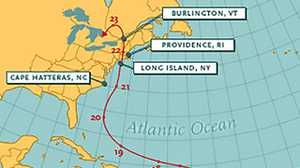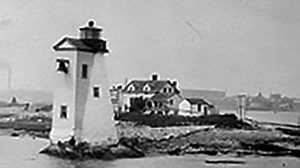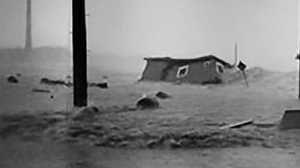Frank A. Crosson

On September 21, 1938, the headlines in the Boston Evening Transcript read "Czechs in Surrender" and below that: "Raging Floods Sweep N.E. [New England], 11 Dead in 4-Day Rain." Local rivers had been flooding even before the hurricane approached.
Frank Crosson was working in a Post Office building at Boylston and Tremont Streets across the corner from Boston Common on September 21, 1938.
Frank Crosson: People kept coming in, telling us about the weather outside. They said the big windows on the department store were all broken, all blown in.
Frank Crosson: After a while, they told us we could go home early, maybe two hours early.
Mass transit was not completely functional, however. From 5 pm until 9 am the next morning, the trains stopped regular service, for the first time in the history of the Boston Elevated Railway. The company rushed buses into service.
Frank Crosson: Taking the bus [back to his home in Brighton] wasn't too bad, but then walking back to the house, you had to watch where you stepped. There were power lines down on the road all over the place, and you had to walk around them.
A less astute resident grabbed a live wire, burning himself, but survived. The wires had been knocked down by all the uprooted trees. Harvard's Arnold Arboretum lost 1,500 trees that day.
Frank's wife Mary was at home with their young daughter. She knew enough to stay inside that afternoon.
Frank Crosson: The playpen was on the back porch, and the wind came up and just blew it right into the yard!
He also had relatives in Fall River, Massachusetts, near the Rhode Island border.
Frank Crosson: My cousin went into Providence, he was a policeman, and he went in to Providence to see a movie or something and when he came out, the water was over the top of his car.
The car was still there, at least. At the East Boston airport, an eight ton aircraft was blown off its moorings 1,500 feet into a swamp. Another flying machine, the Goodyear Blimp, was punctured by its own mast in Springfield, Massachusetts, but pilots and technicians managed to keep the dirigible from blowing away.
The rebuilding effort began right away and the police issued a statement that contractors would not need special permits to work on Sunday.
The day after the flood, the headline news was local, reading, "Disaster Toll Grows." But the following day's headline, "Disease, Hunger Peril," once again referred to the situation in Europe.







